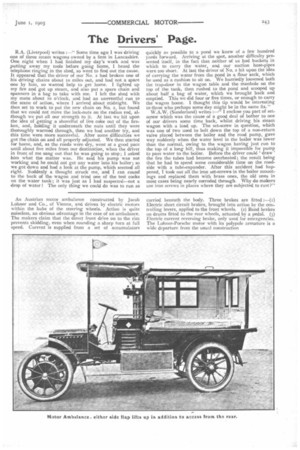The Drivers' Page.
Page 15

If you've noticed an error in this article please click here to report it so we can fix it.
R.A. (Liverpool) writes :—" Some time ago I was driving one of three steam wagons owned by a firm in Lancashire. One night when I had finished my day's work and was putting away my tools before going home, I heard the telephone ringing in the shed, so went to find out the cause. U appeared that the driver of our No. 2 had broken one of his driving chains about in miles out, and had not a spare one by him, so wanted help to get home. I lighted up my fire and got up steam, and also put a spare chain and spanners in a bagto take with me. I left the shed with my mate about to o'clock, and had an uneventful run to the scene of action, where I arrived about midnight. We then set to work to put the new chain on No. 2, but found that we could not move the lock-nuts on the radius rod, although we put all our strength to it. At last we hit upon the idea of getting a shovelful of live coke out of the firebox, and, holding it underneath the nuts until they were thoroughly warmed through, then we had another try, and this time were more successful. After some difficulties we got the chain on and all properly adjusted. We then started for home, and, as the roads were dry, went at a good pace until about five miles from our destination, when the driver in front of me sang out that he was going to stop; I asked him what the matter was. He said his pump was not working and he could not get any water into his boiler; so we got down and had a look at the pump, which seemed all right. Suddenly a thought struck me, and I ran round to the back of the wagon and tried one of the test cocks on the water tank; it was just as I had suspected—not a drop of water I The only thing we could do was to run as quickly as possible to a pond we knew of a few hundred yards forward. Arriving at the spot, another difficulty presented itself, in the fact that neither of us had buckets in which to carry the water, and our suction hose-pipes were too short. At last the driver of No. 2 hit upon the idea of carrying the water from the pond in a flour sack, which he used as a cushion to sit on. We hurriedly loosened both the trap-door in the wagon table and the manhole on the top of the tank, then rushed to the pond and scooped up about half a bag of water, which we brought back and emptied. This we did four or five times, or enough to carry the wagon home. I thought this tip would be interesting to those who perhaps some day might be in the same fix."
W.A.W. (Sunderland) writes :—" I enclose you part of setscrew which was the cause of a good deal of bother to one of our drivers some time back, whilst driving his steam wagon with a load up. The set-screw in question, which was one of two used to bolt down the top of a non-return valve placed between the boiler and the road pump, gave way suddenly when the water level in the boiler was lower than the normal, owing to the wagon having just run to the top of a long hill, thus making it impossible for pump to pass water to the boiler. Before the driver could ' draw ' the fire the tubes had become overheated; the result being that he had to spend some considerable time on the roadside with a tube-expander. After this accident had happened, I took out all the iron set-screws in the boiler mountings and replaced them with brass ones, the old ones in most cases being nearly corroded through. Why do makers use iron screws in places where they are subjected to rust?"
















